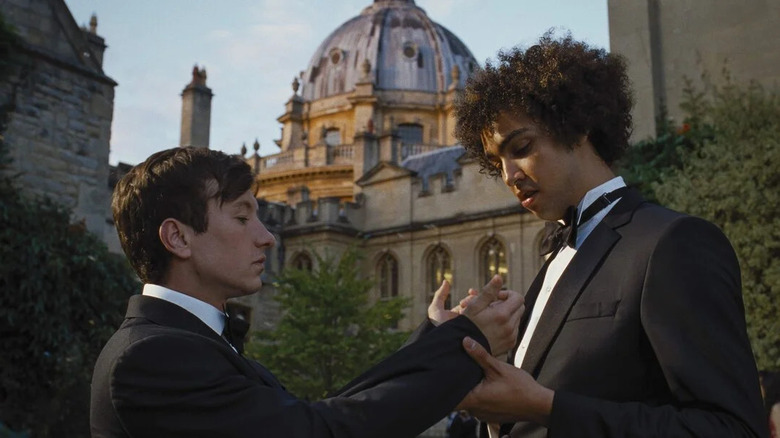No, Saltburn Is Not A 'Poor People Are Evil' Movie
This article contains major spoilers for "Saltburn."
Filmmaker Emerald Fennell is officially two-for-two when it comes to movies that people either love or hate. Her 2020 feature directorial debut, "Promising Young Woman," got everyone hyped with a killer trailer and early rave reviews, but the ending earned a lot of backlash. Now Fennell's second film, "Saltburn," is carving an even sharper chasm in opinion.
It's only fair to confess right away that "Saltburn" is in serious danger of being my favorite film of 2023. First of all, it's a nostalgia-seeking missile for anyone who went to a British university in the mid-to-late aughts, especially when it comes to the needle drops. My other weaknesses include big old houses, comically posh characters, gross stuff, morbid humor, fun villains, lavish costumes, references to Greek mythology, and hot people lounging around having lazy summers, so really, I was doomed to love this one (see also: "Call Me By Your Name").
Even with that bias, it's hard to argue with the more critical reviews of "Saltburn." The major theme is reviewers feeling disappointed that there wasn't more depth to the film — as a character study, as an indictment of the wealthy, or as a commentary on class at all. The charges of shallowness are fair; "Saltburn" is about class in the same way that "The Texas Chain Saw Massacre" is about chainsaws.
No, "Saltburn" is not a movie about a plucky prole sticking it to the wealthy elite. But it's also not, as it's been accused of being, a warning to the wealthy elite that poor people are evil and you shouldn't let them in your house.
Lost in translation
"Parasite" director Bong Joon-ho didn't expect his film to resonate all around the world in the way that it did. "I was amazed by the response because I really thought that this film was just full of Korean details, and the actors — their performances were full of very Korean nuances," Bong told The Black List. His theory for why the film transcended language and cultural barriers so well? "I think maybe there is no borderline between countries now because we all live in the same country, it's called capitalism."
There's a truth to this, but there are almost certainly nuances to "Parasite" that foreign critics and moviegoers missed, even if they loved the movie overall. And while "Saltburn" has drawn plenty of "Parasite" comparisons, it's not set in a country called capitalism. It's set in England: the weird, dysfunctional little nation that was once the seat of an empire, but is now the crumbling core of a not particularly United Kingdom.
English capitalism, and its associated class system, has a massive hangover from feudalism. We still have a royal family, we still have a House of (unelected) Lords, we still have peerages, hereditary titles, coats of arms, seats of power — all things that tend to correlate with wealth, but aren't synonymous with it. Even the wealthiest members of the British aristocracy have only a fraction of Bill Gates' net worth, but many would nonetheless look down their noses at him for being the son of a schoolteacher and an attorney (and, of course, for being an American). In Jane Austen's "Pride and Prejudice," one of the chief objections to Jane Bennet as a prospective match is the fact that her uncle has (shudder) a job.
"I think I have heard you say that their uncle is an attorney on Meryton."
"Yes; and they have another, who lives somewhere near Cheapside."
"That is capital," added her sister, and they both laughed heartily.
"If they had uncles enough to fill ALL Cheapside," cried Bingley, "it would not make them one jot less agreeable."
"But it must very materially lessen their chance of marrying men of any consideration in the world," replied Darcy.
Elizabeth Bennet gets the keys to Pemberley by accidentally playing hard-to-get with the hot rich guy who owns it. Oliver Quick (Barry Keoghan) gets his hands on Saltburn through other methods. But both stories are focused on the bitter stratification of the British upper classes, rather than the vast gulf between the upper class and working class, because ...
Spoilers: Oliver is not poor
The biggest twist of "Saltburn" is the reveal that Oliver is not, as he's told Felix (Jacob Elordi), working class. His mother is not an addict, his father is not a dead drug dealer. Oliver invented the persona of a smart yet underprivileged boy who overcame a terrible, poverty-ridden childhood and earned a scholarship at Oxford, and he invented it specifically for Felix Catton.
Felix is carrying around a big bag of class guilt; he gets agitated when Oliver tries to clean his dorm room, discretely covers the cost of Oliver's round at the pub, and is deeply embarrassed when Farleigh (Archie Madekwe) points out that Felix doesn't even know the names of his own footmen. But he's still a product of his upbringing: seduced by the narrative of the noble peasant trying to pull himself up by his bootstraps. For Felix, rescuing Oliver is a way of proving he's not a "terrible person" like his mother and his elitist Oxford friends. No wonder he's so devastated when he learns that Oliver is middle class — the most boring class of all.
It was odd to discover, in the discourse about "Saltburn" online, that a lot of people walked away from the movie still thinking that Oliver is not only poor, but a representation of what all poor people are like. One review describes the film as "an indictment of the working class." Another proclaims it be "'Parasite,' except the poor people are the parasites." (There aren't any poor characters in the movie, unless you count the footmen and maids).
This particular "whoosh" seems to be mostly confined to American critics. In the UK showing I went to, the audience started laughing as soon as they saw Oliver's real home — a large house with a two-car driveway, a generous front lawn, and a Neighbourhood Watch sticker in the window — clocking that he's lied about his background before either of his parents appear on screen. Felix's obliviousness to what life on the poverty line looks like (as they're pulling up to the house he encouragingly tells Oliver that it looks like his mum has cleaned her act up), got an even bigger laugh. For Felix, the penny doesn't truly drop until he learns that Oliver's dad is still alive. For some, it never fully dropped.
This could be down to economic differences. English homes are a third of the size of American homes, so Oliver's house might not scream "comfortable income" across the Atlantic. But it's also undeniable that people are bringing a lot of baggage to this movie, and that baggage has Emerald Fennell's name monogrammed on it.
'Jewellery empire nepo baby'
One takedown of "Saltburn" by a British writer (so the cultural differences excuse doesn't apply) hedges its bets by calling Oliver "middle/working class" and condemns the film as "a morality tale for the privately educated, that moral being 'keep an eye on the silverware, lords and ladies, those greedy lower classes want to get their hands on our riches." Fennell herself is described as "a jewellery empire nepo baby who counts everyone from Andrew Lloyd Webber to Madonna as family friends."
First of all, "jewellery empire" is a bit of a reach. Fennell's father, Theo Fennell, came from an army family, attended Eton, went on to art college, and then apprenticed with a silversmith. After launching his own jewellery company, Fennell's ostentatious designs attracted a pool of high-profile celebrity clients, earning him the nickname "the King of Bling." But the company's annual turnover peaked at around £35 million — not exactly empire territory. In fact, soaring rents recently forced Fennell to move his business out of its flagship Fulham Road store to a slightly cheaper location.
To refer back to the example of Bill Gates, wealth acquired from learning a trade and building a business is not nearly as respectable (at least, in the view of the British upper crust) as birthright wealth. Mr. Darcy's much-admired ten thousand a year in "Pride and Prejudice" comes from inheriting Pemberley, along with half of Derbyshire. Darcy himself is unemployed but (to borrow a quote from "The Good Place") he's unemployed in the "good, rich way."
Equating the Fennells' wealth with the Cattons in "Saltburn" is simply incorrect. The Fennells are firmly new money, with no inherited country estate or titles. In terms of both wealth and class, Emerald Fennell is actually somewhere in the middle between the Cattons and Oliver. If Fennell is indeed unqualified to make a movie about the specific class tensions in "Saltburn," then by extension Bong Joon-ho had no right to direct "Parasite." After all, Bong's family was not poverty-stricken like the Kim family, or rich like the Park family. "I grew up in a middle-class family," he told The Guardian. "Even in terms of real estate, the house that I grew up in is in the middle — between the semi-basement home and the rich house you see in the film. I was really close with friends and relatives from both classes."
"Saltburn" and "Parasite" are very different films, but what they have in common is that neither paints the rich as villains and the lower classes as heroes, or vice versa. Looking for a message or a moral or a lesson in "Saltburn" is a fool's errand. If the movie can be said to have a message at all, it's this:
Eat the rich (for fun and profit!!)
At the end of Christian Tafdrup's 2022 horror film "Speak No Evil," a character who has been subjected to unspeakable horrors by the film's antagonists asks them, in a final desperate plea, "Why are you doing this?" The reply: "Because you let me."
In "Speak No Evil," the family's undoing is their fear of being rude to their Dutch hosts. In "Saltburn," the Cattons' fatal mistake is inviting Oliver into their home and underestimating him. The antagonists of "Speak No Evil" are not supposed to be representative of all Dutch people, and Oliver does not represent the entirety of the English middle class. He's a unique specimen, and he brags about being so when he tells Elspeth (Rosamund Pike) that the Cattons grew complacent and vulnerable because they had "no natural predators. Well, almost none."
The Cattons have invited plenty of pets into their home before, from Poor Dear Pamela (Carey Mulligan) to a former friend of Felix's who was ousted for daring to try to have a relationship with Venetia (Alison Oliver). None of them did what Oliver does. Even Oliver's nemesis, Farleigh, is confident in his protected status despite having to beg his cousin for a share of the Catton wealth. At an ethereal "Midsummer Night's Dream"-themed birthday party, Farleigh scornfully tells Oliver that this will only ever be a dream for him, whereas Farleigh's bloodline gives him a birthright claim to Saltburn that can't be usurped.
As Oliver demonstrates, there is another way to become king of the castle: lay siege to the castle, and kill everyone inside. Not because they deserve it, or because you particularly deserve a castle, but simply because you can. That's the gleefully amoral spirit of the music video for Sophie Ellis-Bextor's 2001 hit "Murder on the Dancefloor," which sees Ellis-Bextor cheating her way to the top of a dance competition podium by crippling her rivals and seducing a judge. Hey, if you're going to do evil, you might as well make it sexy.




